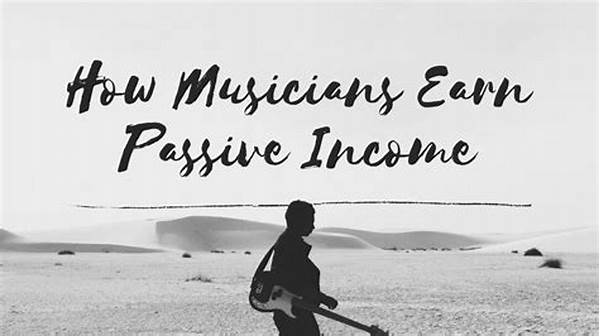
In the dynamic world of music, where rhythms and melodies reign supreme, musicians often find themselves in a relentless pursuit of creativity and success. But have you ever wondered how musicians earn passive income from royalties while they sleep or work on their next big hit? It’s a reality that many successful artists enjoy, and it’s a financial strategy that allows them to keep cash flowing even when they aren’t actively performing. This concept of earning money while doing minimal active work might seem like a dream to many, but for musicians, it can be an attainable reality, with royalties playing the starring role in this melodious play.
Read More : How To Build A Passive Income Portfolio In 2025
Picture this: a young musician strumming chords in their bedroom, dreaming of the day their music will resonate with audiences worldwide. Fast forward a few years, and this musician’s songs are playing on radio stations, streaming sites, and in films. The magic of royalties begins when a song that was once a personal creation becomes a part of the collective public experience. Each time it gets played, used, or streamed, it generates income—royalties. These royalties are a form of passive income as they keep flowing in long after a musician has finished recording. With the increasing prevalence of digital platforms, the opportunities for musicians to earn more have expanded exponentially.
The Financial Symphony
Enter the financial symphony orchestrated by royalties, where every note played on a streaming service or broadcast earns musicians their deserved due. But what exactly are royalties? In essence, they are payments musicians receive based on the usage of their intellectual property, such as songs, lyrics, or compositions. Royalties can be earned through various channels, like performance rights organizations (PROs), streaming services, and licensing deals for commercials, films, or TV shows. Each channel offers a unique opportunity for musicians to maximize their earnings.
For musicians stepping into this world, it’s essential to understand the nuances of each source of royalty income—mechanical royalties from physical sales or streams, performance royalties from public performances, and synchronization royalties from audiovisual works. By navigating these avenues strategically, musicians can curate a lasting financial legacy.
Mastering the Royalties Game
The journey to mastering the royalties game takes more than just musical talent. It demands a fusion of creativity, business savvy, and sometimes, a touch of humor. Imagine discussing royalties over coffee, explaining the intricacies of how every spin on Spotify transforms into pennies. Engaging with platforms that support musicians and understanding contracts intricately is crucial. By employing agents or royalty collection services, musicians ensure that no dime earned goes unnoticed. Many artists also venture into self-publishing or establishing their own labels to retain a more significant piece of the royalty pie.
Musicians who adapt to the evolving landscape of music consumption by leveraging social media, digital marketing, and brand collaborations can build robust passive income streams from royalties. A single hit can sustain an artist for a lifetime, but continued success comes from diversifying revenue through various channels.
Navigating Royalties: From Creation to Income
Understanding how musicians earn passive income from royalties hinges on their ability to navigate the industry’s labyrinthine structure. Establishing connections with industry professionals and learning from pioneers who have mastered the game are key steps towards success.
Strategies for Maximizing Royalties
With a solid foundation laid, it’s time to delve into strategies musicians can adopt to maximize their potential passive income. This involves exploiting multiple platforms to broaden their audience reach and negotiating better royalty terms. Musicians should seek to understand the legalities of their contracts and the channels from which they derive income to ensure maximum profitability. Engaging in continuous learning, attending workshops, and seeking mentors can also provide invaluable insights into the royalty landscape.
Concerts and merchandise sales are traditional income avenues, but digital platforms like Spotify, Apple Music, and YouTube provide opportunities to reach millions worldwide, each play contributing to their income. By expanding their audience and crafting engaging, shareable content, musicians can leverage digital virality to boost their royalty income exponentially.
—
In the realm of creativity, musicians wield the power of music not only to inspire but to also establish sustainable income streams. Curious to know how it’s done? Here are tangible examples:
Understanding the Journey of Royalties
The path of how musicians earn passive income from royalties is intricate yet rewarding. By realizing the potential hidden in every note and scale, musicians unlock a world of financial stability through their craft’s creative expression.
Investigating Royalty Streams
As the music industry evolves with technology, musicians must stay ahead to leverage new avenues effectively. For instance, with blockchain technology’s emergence, artists can gain more transparency and direct-to-fan transactions. This highlights how understanding evolving royalty streams can revolutionize musicians’ incomes.
When musicians explore their royalty options, it’s akin to embarking on an adventurous quest—be it fighting for fairer contracts, mastering digital platforms, or diversifying income sources. The effort is worth it, transforming their music from a passion project into a viable economic venture.
Earning passive income from royalties isn’t just about financial gain; it’s about understanding its potential and leveraging it efficiently. Every chord struck offers musicians the chance to harmonize their love for music with lasting financial wellness.
—
In music, artistry and entrepreneurship dance together in perfect harmony, crafting a plethora of earning possibilities. Let’s explore some illustrations of these opportunities:
Music’s storytelling grace seamlessly intertwines with financial strategy, showing musicians how to extend their melodies into ongoing royalty revenues. They say every song tells a story, and equally, every stream contributes to the symphony of passive income.
Understanding how musicians earn passive income from royalties opens a gateway not only to the foundational aspects of music business yet also to a financially fulfilling career in the ever-evolving soundscape.


